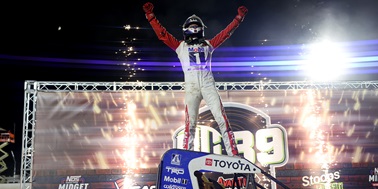Call it a “Myles-tone,” if you will.
No pun intended, but that’s how Force Indy Team Principal Rod Reid described his team’s first USF 2000 victory Sunday at New Jersey Motorsports Park when Myles Rowe became the first Black driver to win an INDYCAR-sanctioned race.
For Rowe, 21, it was the culmination of years of hard work, dedication and perseverance that paid off in the most impressive way. Driving the No. 99 in mixed conditions, he muscled his way past points leader Kiko Porto on the last lap in what he called a “dream” scenario.
“The relief that I felt when I crossed the line, I’ve never felt anything like that before,” Rowe said. “That will stick with me forever. I’m really happy to deliver for the team. I’m here to succeed. We’re here to win races, and it’s just really good to see that can happen. We’re coming.”
For Reid, the victory was the culmination of hard work and dedication he has put forth since starting NXG Youth Motorsports after he was frustrated by the lack of diversity in racing. Also known as Nexgeneracers, the 501c3 introduces minority students to motorsports through STEM education with the mission to help minority kids find careers in motorsports.
Reid, who announced the creation of Force Indy in December as part of the Race for Equality & Change initiative of INDYCAR and Indianapolis Motor Speedway, has been working so hard to diversify motorsports and help others realize their dreams of working in racing that the fact this is also his dream was an afterthought. But with a little bit of retrospect, the idea that Rowe and Force Indy’s success is also Reid’s success is not lost on him.
“From where we’ve been at the beginning of the season to where I think we’re starting to be at now, it’s a culmination of so many things,” Reid said. “I’m almost in tears. I think, like with most people that have made lifelong dreams … I hope and pray that this is the beginning.”
With Rowe on a path through the Road to Indy ladder system with the goal of eventually reaching the NTT INDYCAR SERIES and Reid expanding NXG Youth Motorsports to the Detroit area, both point out that this is just one stop on what they hope is a long road ahead of breaking records, breaking barriers and creating change.
With an eye toward the future, it’s also important to put in perspective the historical significance of Rowe and African American-led Force Indy’s achievement. Forever, Rowe will be known as the first Black driver to win in the Road to Indy ladder system, while Reid will be known as the one that gave Rowe, and likely many more, their big break.
Reid said when he was told of the accomplishment following the race he was taken aback. It wasn’t a goal that was on his radar, but he is extremely proud that his team and his driver are paving the way toward a brighter future in North American open-wheel racing.
“We have that mission of wanting to win races and compete and be strong competitors, and then we have the mission of giving an opportunity to young men and women that would typically not get a shot simply because they haven’t had folks that are focused on making sure there’s Black and brown people in motorsports,” Reid said. “I think it’s a win-win for both of those.
“We were able to give them a shot. Force Indy is about that. Showing that they have the ability and that we can do this is huge. That’s the weight that we carry, but that’s also the joy in having something like (Sunday).”
Rowe, on the other hand, grew up looking for representation in motorsports. Eventually taken under the wing of 2014 NTT INDYCAR SERIES champion Will Power, he never quite found someone who looked like him that he could emulate.
Rowe, a Pace University student, said while being a winning race car driver always has been the goal, he has also had a dream of being a positive influence for young minority children, especially those who aspire to compete in motorsports.
As for the historical significance of forever being known as the first Black winner of an INDYCAR-sanctioned race, it’s not a goal Rowe set out to achieve, but he is proud to carry the honor.
“It really means a lot to me that I can be in a place in history where I can maybe inspire somebody and help influence somebody to drive to have some discipline, to drive to have work ethic, to drive to have passion,” Rowe said. “I’m so privileged to arrive in a spot where I can have that sort of influence.
“All I can do about it is be the best I can, try to be as aware as I can, as disciplined as I can and make sure that I represent and show them what it means to be a good character and a good human being and to just influence younger people to be the best they can and to evolve constantly day in and day out for a better world in our future.”
Rowe, who starts classes next week in New York City, has one more USF 2000 race weekend to prepare for Oct. 1-3 at Mid-Ohio Sports Car Course. Regardless of what happens in the doubleheader, his win is a bookend to what has been a big year for the Race for Equality & Change in 2021.
On April 17 at Barber Motorsports Park, Yuven Sundaramoorthy became the first driver of Indian descent to win an INDYCAR-sanctioned race when he won the opening race of the USF2000 season.
The following day, Danielle Shepherd became the first woman to go over the pit wall for a winning car in INDYCAR SERIES history as Alex Palou scored his first career win in the No. 10 Chip Ganassi Racing Honda. And in May, female-led Paretta Autosport made its debut in the Indianapolis 500 presented by Gainbridge with driver Simona De Silvestro.
Remember: these accomplishments aren’t the end. They’re just milestones along the way to more history.




